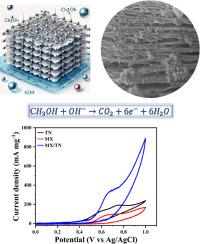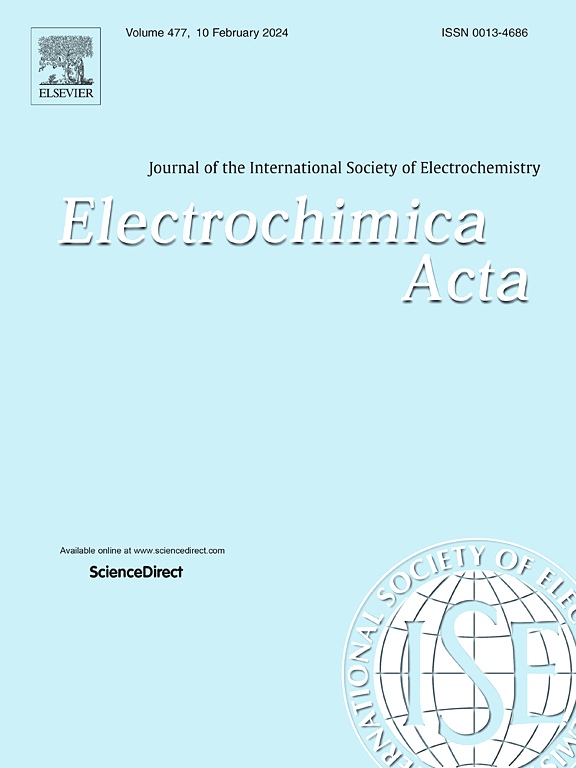Synergistic MXene/TiN Nanocomposite as a Noble Metal Free Catalyst for Efficient Methanol Electro-Oxidation in Alkaline Fuel Cells
IF 5.6
3区 材料科学
Q1 ELECTROCHEMISTRY
引用次数: 0
Abstract
The first-time synthesis of a noble-metal-free Ti₃C₂Tx MXene/titanium nitride (TiN) composite electrocatalyst with exceptional performance for the methanol oxidation reaction (MOR) in alkaline direct methanol fuel cells (DMFCs) is reported in this study. The composite is synthesized via a two-step strategy combining hydrothermal treatment and subsequent nitridation, resulting in a well-integrated heterostructure with enhanced conductivity and active surface area. Structural analyses confirm the successful formation and uniform elemental distribution of the layered MXene/TiN hybrid. Electrochemical measurements reveal a remarkable peak current density of 375.5 mA cm⁻² and a maximum power density of \∼48 mW cm⁻², significantly outperforming pristine TiN (\∼22 mW cm⁻²) and MXene (\∼13 mW cm⁻²). This enhancement is attributed to the synergistic interaction between the highly conductive 2D MXene sheets and catalytically active TiN nanoparticles, which together promote efficient charge transfer and accelerate MOR kinetics. Compared to previously reported MXene- or TiN-based catalysts, this binary system demonstrates superior integration, higher power output, and greater long-term stability-without reliance on noble metals. These findings highlight the potential of MXene/TiN composites as scalable, cost-effective electrocatalysts for next-generation sustainable fuel cell technologies.

协同MXene/TiN纳米复合材料作为碱性燃料电池中高效甲醇电氧化的无贵金属催化剂
本文首次合成了一种不含贵金属的Ti₃C₂Tx MXene/氮化钛(TiN)复合电催化剂,该催化剂在碱性直接甲醇燃料电池(dmfc)中具有优异的甲醇氧化反应(MOR)性能。该复合材料通过水热处理和随后的氮化两步法合成,得到了具有良好导电性和活性表面积的异质结构。结构分析证实了层状MXene/TiN杂化物的成功形成和均匀元素分布。电化学测量显示其峰值电流密度为375.5 mA cm⁻²,最大功率密度为\ ~ 48 mW cm⁻²,明显优于原始TiN (\ ~ 22 mW cm⁻²)和MXene (\ ~ 13 mW cm⁻²)。这种增强是由于高导电性的2D MXene薄片和催化活性的TiN纳米颗粒之间的协同作用,它们共同促进了有效的电荷转移并加速了MOR动力学。与之前报道的基于MXene或tin的催化剂相比,这种二元体系具有更好的集成度、更高的功率输出和更大的长期稳定性,而且不依赖于贵金属。这些发现突出了MXene/TiN复合材料作为下一代可持续燃料电池技术的可扩展、经济高效的电催化剂的潜力。
本文章由计算机程序翻译,如有差异,请以英文原文为准。
求助全文
约1分钟内获得全文
求助全文
来源期刊

Electrochimica Acta
工程技术-电化学
CiteScore
11.30
自引率
6.10%
发文量
1634
审稿时长
41 days
期刊介绍:
Electrochimica Acta is an international journal. It is intended for the publication of both original work and reviews in the field of electrochemistry. Electrochemistry should be interpreted to mean any of the research fields covered by the Divisions of the International Society of Electrochemistry listed below, as well as emerging scientific domains covered by ISE New Topics Committee.
 求助内容:
求助内容: 应助结果提醒方式:
应助结果提醒方式:


